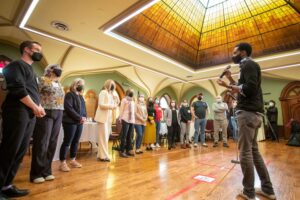
McGill is the host of the newly established Canada Hub of Falling Walls Engage, a global network that fosters science engagement by connecting practitioners with science-related institutions, researchers, and the public. The network is organized by the Berlin-based Falling Walls Foundation, which hosts workshops and pitch competitions, an international science summit, and promotes networking among researchers, business leaders, media, policymakers, and others. The Foundation champions an experiential approach to science education and to spreading scientific research through innovative communications activities and events.
The Falling Walls Engage Hub Canada is one of six Falling Walls Hubs spanning the globe, including ones in Kenya, Sweden, Argentina, Australia, and Greece. Conceived as satellites of the larger Foundation, the network expanded with the launch of a hub in Mexico in June and there are hubs set to launch this fall in South Africa and Japan. Hubs carry out a range of programs including community building events, training workshops, and public science showcases all aimed at mobilizing scientific research for public good. Embedded locally and connected globally, the hubs can share regional perspectives and facilitate sustainable partnerships between individuals, communities, and institutions near and far.
“McGill is proud to host the Falling Walls Engage Hub Canada and to be the connecting force for collaborations across the network,” says Martha Crago, Vice-Principal, Research and Innovation. “McGill’s researchers and students are generating key knowledge on some of the most pressing issues of our times, such as limiting the spread of COVID-19 and addressing the systemic inequities faced by Indigenous communities in Canada. We look forward to engaging our experts in the many Canada Hub initiatives supporting science and science-based policymaking in the months and years to come.”
The Hub’s central priority is to promote inclusion and increase the diversity of voices in science. “Regardless of background, geography, or circumstances, science impacts every person,” says Brett Hooton, Hub Manager for the Falling Walls Engage Hub Canada and Director, Communications and Operations, for Research and Innovation. “The most successful Science Engagement efforts—and what we should strive for in all public discourse—is to value all voices equally.”
Building bridges in Science Engagement
In May, the Canada Engage Hub held a “Symposium for Science Engagement: Communicating the Urgency of Planetary Health” at McGill in collaboration with the Science Writers and Communicators of Canada. The in-person event brought together 40 science and environment writers and outreach professionals, representing six countries and 23 organizations. Participants took part in a day of workshops, networking, and presentations devoted to discussing the challenges faced in supporting planetary health – the theme of the Falling Walls Foundation’s program this year – and the potential for change through science engagement.
Sessions featured leading Canadian and international communicators and scientists, including Oscar Contreras-Villarroel, who heads external relations for the Giant Magellan Telescope and manages the Falling Walls Engage Hub in Argentina; Ursula Eicker, Canada Excellence Research Chair in Smart, Sustainable and Resilient Communities and Cities at Concordia University; Milton Riaño, a Columbian media-artist and McGill’s first Climate Change Artist in Residence; and Anthony Morgan, a finalist in the 2020 Falling Walls Engage Pitch competition for his work as founder of Science Everywhere, which creates adult-focused science entertainment events in Toronto.
Previously, the Hub held a two-day virtual community workshop focused on exploring the roles of equity, diversity, and inclusion in science engagement, which brought together 30 science engagers from around the word. The Hub also took part in the Royal Society of Canada’s annual Celebration of Excellence in Engagement conference in 2020.
